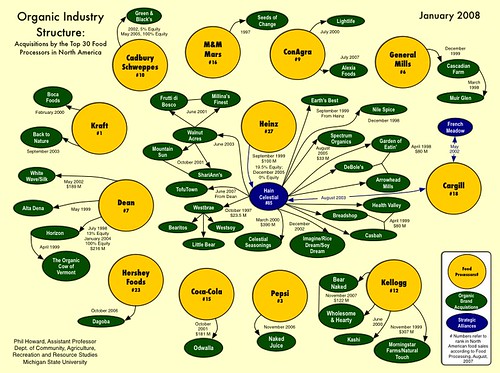There's been a small discussion over at the
Last Appetite about the dearth of good food writing in the mainstream media, from which this excellent quote emerged
Steingarten in Vogue reminds me a little of running “quality” articles in Playboy magazine.
Phil Lees, 2008
Serious talk of food seems now to be relegated to a seemingly endless list of single commodity food analyses which Nalika once described as "crude"
Their basic premise is to illustrate wider economic, social, political and environmental issues through analysing one type of food. And it seems increasingly to be the stock and trade of many an academic these days seeking to escape their dusty old offices to seek fame and fortune on book signing tours for serious "foodies"
I began a list of these a while ago, and I'm sure that the list is incomplete, but here are some (are there anymore that you can think of?)
- the banana book “Banana: The Fate of the Fruit That Changed the World”
- the oyster book “The Big Oyster: History on the Half Shell"
- the cod book “Cod: A Biography of the Fish That Changed the World”
- the sushi book “The Sushi Economy: Globalization and the Making of a Modern Delicacy”
- the coffee book ” The coffee paradox: Global markets, commodity trade and the elusive promise of development ”
- the rice book “Rice and Man”
- the potato book "The Potato: How the Humble Spud Rescued the Western World"
- The salt book "Salt: A World History"
- The spice book "Spice: The History of a Temptation"
- the chocolate book "The True History of Chocolate"
- the corn book "Corn and Capitalism: How a Botanical Bastard Grew to Global Dominance"
- the vanilla book "Vanilla : The Cultural History of the World's Favorite Flavor and Fragrance"
- and a forthcoming is a book on the matsutake mushroom
As I said in the comments page of Last Appetite, it sometimes makes me want to yell “argghhhh…we get it food is symbolic of wider economic, political, social and environmental issues”. But the point is that food writing varies from the sublimely silly and superfluous to the deeply analytical and enlightening. Personally I like a bit of sugar with my fibre, junk food for my brain if you will.
But now comes a new type of food book, in line with
Patel's Stuffed and Starved these new food books do not focus on one type of food and the limited insight that they may afford of a vastly complex system, they are not seeking to make you feel more enlightened about your everyday commodities but rather explain to you why we're all fucked.
The book ,The End of Food by Paul Roberts explains that while industrial food may be in crisis, its still making the best out of a bad situation.
A reviewer says Reading through the recent food-politics bookshelf, it's too easy to take away an "industrial food bad, local food good" attitude. But how many modern-day locavores would readily embrace the life of, say, a 19th-century prairie farmer, tending to livestock, grain crops, and a vegetable patch without electricity or machine power? Shopping at farmers markets and joining CSAs -- activities I wholeheartedly support -- present a necessary challenge to a global food system gone mad, but are unlikely to prove sufficient for transforming it. To mount a real challenge, we'll need a clear-eyed grounding in the history and economics of food production, in addition to locavore zeal. And that's were Roberts makes an important contribution.....Robert's historical frame drives home a key point that his predecessors didn't quite nail down: In many ways, modern food production is an attractive response to centuries of chronic food insecurity. Who wants to spend nearly all of one's income on food, and rely on sugared tea as a key source of calories, as did the 19th-century British working class? Who wants to spend hours a day preparing food as peasant women did, not by choice but for survival? By the dawn of the 20th century, people quite understandably longed for food security and freedom from drudgery. The modern food system -- for all of the new problems it created -- largely met those desires, at least in the United States and Europe. The locavore movement will eventually have to confront them head on.
Yes, who indeed wants to live like a peasant? (aside from you Phil and Hock who's apparent dream is to spend all of their waking hours cold smoking meats and makin bacon)
Basically, the point is that yes modern food is deeply problematic but if we get rid of it human kind will undoubtedly face starvation....the end of food, and all those mindlessly indulgent food writers and bloggers and the equally useless academics that go along with it.

